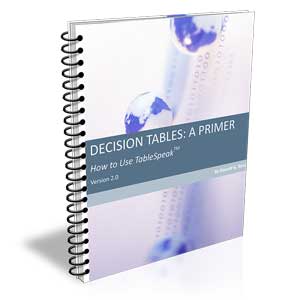Is This Statement a Business Rule?
I recently reviewed a document for another business analyst and, with a stroke of a pen, marked through a large section of his document and proclaimed, "These are not business rules." He was shocked, angry, then confused, "How can these not be business rules?" Not every statement is a business rule; there are 'non-business rules', such as guidelines or advice.
How does a Business Analyst determine a statement is an actual business rule?
According to the IIBA Business Analyst Book of Knowledge (BABOK), a business rule should be:
- based on business vocabulary.
- expressed separately from how the rule is enforced.
- defined at a low level.
- expressed in declarative format.
- separated from processes.
The BABOK definitions are good guidelines, but I prefer to use Ron Ross' five tests to confirm my statement is truly a business rule:
- The rule is practicable.
- The rule is about the business and not about a system or a platform.
- The rule is expressed in the language of the business, not in the language of the system or the platform.
- The rule must be under business jurisdiction.
- The rule must remove a degree of freedom.
Consider the following statement:
"Commercial passengers flying to the moon should do so in a two-stage Heavy Lift Vehicle."
Is this a business rule?
Test 1. The rule is practicable. Practicable means a business person could determine if the business is fulfilling the rule. The statement includes "… should do so in a two-stage Heavy Lift Vehicle"; however, if the commercial passengers are booked on a three-stage Super Heavy Lift Vehicle, could a business person determine the business is fulfilling the statement? In my opinion, no, and therefore, the statement fails Test 1.
Test 2. The rule is about the business and not about a system or a platform. The statement specifies a platform, "… a two-stage Heavy Lift Vehicle …"; so it fails the second test.
Test 3. The rule is expressed in the language of the business, not in the language of the system or the platform. It is unlikely that the business people refer to a 'rocket' or a 'vehicle' as a "two-stage Heavy Lift Vehicle." The statement fails the third test.
Test 4. The rule must be under business jurisdiction. The Engineering Department (I hope!) determines what vehicle is most appropriate to fly commercial passengers to the moon. Since the business would not make this decision, the statement fails a fourth time.
Test 5. The rule must remove a degree of freedom. If the statement does not identify the business' responsibility or the exclusion of the business behavior, then it fails to remove a degree of freedom. The statement fails to identify either.
Now we have the answer: "Commercial passengers flying to the moon should do so in a two-stage Heavy Lift Vehicle" may be good advice and guidance, but it's not a business rule.
For more about Ron Ross' Business Rule tests, read What Is a Business Rule?
# # #
About our Contributor:
Online Interactive Training Series
In response to a great many requests, Business Rule Solutions now offers at-a-distance learning options. No travel, no backlogs, no hassles. Same great instructors, but with schedules, content and pricing designed to meet the special needs of busy professionals.











